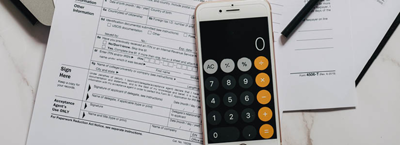
Some things in life you can plan for. Others you can’t. Unexpected expenses can’t be predicted - and can play havoc with your home finances.
In this guide, we’ll:
- Tell you what is meant by unexpected expense
- Discuss real-world examples and give solutions
- Look at other ways to prepare for the unknown
What is an unexpected expense?
An unexpected expense is anything that you have to pay for that you hadn’t prepared for in your monthly budget. This could leave you without funds for important payments like rent or bills.
The best way to avoid being caught out unnecessarily by unexpected expenses is to keep track of your finances. It’s easy to forget - and not plan for - monthly subscriptions or bills. Don’t let an errant gym subscription or council tax bill blindside you! Take the time to sit down and go through all your regular outgoings, so you can factor them into your budget and avoid any nasty surprises.
However, you can’t prepare for everything. So, what else can you do to prevent unexpected expenses from boring a hole in your bank balance?
Set aside a percentage of your income each month
Clearly, you can’t anticipate an unexpected expense. But you can estimate how much it’ll cost to repair your car, pay for that higher-than-usual heating bill or get the plumber out. Putting aside a given percentage of your monthly household income would give you a separate pot of money to dip into in an emergency. Think of it as day-to-day insurance, and avoid dipping into it when it’s not needed - even if that takeout sounds tempting!
So - what can be classified as an ‘unexpected expense’?
An unexpected expense is one you couldn’t have planned or budgeted for. It could be anything from an act of God (like a natural disaster) through to a medical emergency that happens out the blue. It could be something more mundane, however, like a leaking tap or the engine light coming on in your car.
Does this mean you’re at the mercy of fate? Not necessarily. But these aren’t events you can neatly factor into your monthly budget. A different type of planning is needed to meet challenges like these head on.
Types of unexpected expenses
A one-size-fits-all approach to dealing with unexpected costs is impossible. That’s because every scenario is unique - meaning a different strategy is needed depending on the type of expense. Some situations can be neatly covered-off using insurance. Others might involve using a comparison site or learning how to do something yourself to save paying a professional.
1. Serious Vehicle Repairs
Anticipating how much your car will cost to run per year is relatively easy. You know how many miles you travel per year - and, of course, your vehicle will need its annual MOT and service. You’ll probably budget for other small jobs too, like paintwork to repair minor scratches, or fitting a replacement tyre.
But what if your car is involved in a serious accident or stops working because of a mechanical fault? The costs involved could be crippling - especially if you’re unable to claim through your insurance.
The average cost to repair a used car in the UK is £603.00, which is quite a steep figure. Could you find that much money in a hurry if the unexpected happened?
Solutions:
Rely less on your car. By taking public transport you’ll (i) reduce the likelihood of an accident; (ii) place less stress on your vehicle - slowing down unwanted wear and tear.
Do the work yourself. Some of the less complex mechanical jobs can be completed from the ‘comfort’ of your driveway. For example, many car parts can snapped into place.
Check your car insurance. Is it worth upgrading to fully comprehensive insurance for peace of mind? Sometimes it can be the same price or cheaper than third party, fire and theft.
2. Household Disasters
As with vehicles, it’s a given that your home is something of a money pit. Putting aside a set amount of money each year (for example, 1% of your income) is a great way to pay for things like replacement windows, new paving slabs, deep pressure patio cleans, or guttering.
But what if something serious were to happen? In the event of subsidence for example, your home would need re-pinning - and that could cost anything up to £50,000.
Alternatively, you might need to replace your electrics, which would again entail significant expenses.
Putting aside a percentage of the value of your home each year is recommended. The average cost of a property in the UK is £215,847. If you put away 1%, that would equate to an emergency pot of £2,158.47 per annum.
Solutions:
Stay on top of your DIY. Sticking to a regular maintenance routine will help prevent expensive-to-solve issues later on.
Check you’re insured. In some cases, insurers will pay for repairs to your home - so it might be worth investing in a monthly policy.
If you rent your property, then you might want to consider setting aside a budget in case your rent increases. Rent usually increases in line with inflation, but it can also increase between 3-5% each year.
3. Emergency Travel
You can plan holidays into your yearly budget. You can even put some extra money in the kitty to cover any unexpected expenses for travelling - like a last-minute dash to collect a relative from the airport or to help out a friend in need.
Travel emergencies can catch you by surprise though. A relative inviting you to a wedding in some exotic and far-flung location is likely to be expensive and probably isn’t something you thought about when plotting out your yearly expenses. Remember that you can always turn down an invitation if it’s going to have a long-term negative impact on your finances.
Accommodation and flights are likely to cost you an eye-watering £229 and £249 respectively on average. That’s without factoring in the cost of food and other expenses.
Solutions:
Use comparison sites to find cheaper flight and accommodation deals and buy your own food when you’re there - rather than eating at your hotel or going out.
Create a separate emergency fund for travel in case you miss any transport links.
Other ways to avoid unexpected expenses
Apart from the hints and tips shared so far in this guide, what else can you do to avoid unexpected expenses? One way could be to assume the worst will happen and prepare for it.
Here are three things you could do:
- Sell unwanted goods. Those items you no longer use could be sold for a tidy sum on eBay or Facebook Marketplace. You might not make a fortune - but at least you’ll be able to top up your emergency fund.
- Reduce your debt. Money you’re spending on loans or credit card bills is money you can’t use to pay unexpected expenses. Budgeting to reduce what you owe, or consolidating your debt into more manageable payments, could provide the extra breathing space you need.
- Find an additional income stream. Taking on another job (even if just for a short period) is a great way to shore up your coffers. Even working just two evenings a week could make a huge difference to your savings.
Further Reading
You may also want to look at:
>> How to make good financial decisions
>> 9 ways to save money on a tight budget
>> Free online budget planner
About Salad Money
We specialise in providing small short-term loans to employed people across the UK who might struggle to get credit elsewhere. To do this, we use a system called Open Banking which allows us to assess applications without the need for a credit check.
Applying for one of our new loans doesn’t impact your credit score. We use Open Banking in our initial assessment. If successful, we report your loan to the CRA’s (Credit Reference Agencies). Your credit score won’t hold you back from being eligible.



